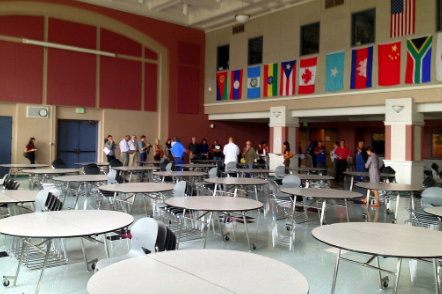
Re-Setting the Lunchroom Table
Forgiving my bullies meant forgiving myself too.
It is 1974, and I am 12.
I can see the rectangular Formica-topped table against the back wall of the middle-school lunch room, with its smell of mystery meat and burnt pizza; cheerless fluorescent lights cast a sickly pallor over the five or six girls seated around the table. Rachel, the precocious, vivacious and charismatic leader of the pack. Jenna, impish and laughter-prone; Sarah, kind, but less outgoing than the others; Allison, friendly, easygoing and athletic; and Katherine, brilliant, beautiful and oh-so-cool. I take a seat. A conversation is underway and I join in. But there’s no response. I repeat myself—still silence. The silence continues for years. The girls at the table no longer acknowledge me in class or in the hallways. I don’t know why, and they won’t explain though I ask repeatedly. I am that dorky!
Eventually, I make new friends, but the memory doesn’t fade. It only serves to reinforce what I have long feared— I’m a weirdo who doesn’t fit in. I’m not hip enough, talented enough, charming enough or pretty enough to be part of this elite gaggle of girls.
It is 2020, and I am 57.
Still plagued with self-doubt and still replaying that day in the lunchroom from time to time, I feel frustrated with my inability to put this behind me. How can I bring myself to forgive them and forgive myself?
Judaism has a lot to say about forgiveness, and repentance (teshuva). According to Maimonides: “When one person sins against another, [the victim] should not harbor hatred and remain silent.” (Hilchot De’ot 6:6)
At long last, I take Maimonides’s advice. I decide to contact some of the girls from my middle school memories. In the age of social media and the internet, it isn’t hard to find them. My search reveals that Interestingly, all but one are therapists or special educators.
To prepare to approach them, I compose an email that explains my intention: to interview women in our middle and high school class about their experiences with bullying, cliques and peer exclusion. I list some questions, one of which is: “Looking back, would you have handled anything differently?”
I tell my classmates their answers and identities will remain confidential so they can feel free to answer candidly.
Rachel, so obviously the group leader, was the first one I contacted. She seemed pleased to hear from me, and we set up a phone date. Over the years, I had seen Rachel at high school reunions and for a time, we were colleagues at a New York City hospital. Still, I felt nervous about the phone call. I didn’t plan to ask directly about the lunchroom incident, but I was fairly confident it would come up. After we filled each other in about kids, jobs, spouses, etc., we got down to business. “I don’t think I started the lunchroom thing, but I went along with it,” Rachel admitted. “Middle school was dog eat dog. Everyone was very aware you could get booted, move up or move down.”
Rachel recalled my self-consciousness and anxiety. “When you see anxiety in 7th grade, you don’t want to be anywhere near it,” she said.
Rachel was right about my anxiety. I’m terrible at hiding it. My desire for acceptance and deep connection has been an all-consuming concern for as long as I can remember. Even as a two-year-old, I lived to visit my friend Jeannie, another 2-year-old who lived in our apartment building. As a four-year-old nursery schooler I obsessed about having the right clothes—Danskin stretch pants, not the store brand! In the second grade I complained of being sick to avoid going to school, where I believed (with no actual evidence) that nobody liked me.
“I was mean to you,” said Rachel. “I apologize.” She urged me to call her next time I came to New York. “I’d love to get together,” she offered. During my conversation with Rachel, I learned that Jenna had later been excommunicated from the group as well. Jenna, whose parents were going through a divorce at the time, was so distraught by the ousting that she eventually transferred to another school.
When I reached out to Jenna by email, she confirmed that sometime during 7th grade she was “ostracized” by the group. “It was very important to me to be friends with those kids,” she said. “Some had been friends since elementary school so it felt terrible when they kicked me out. I never quite knew why it happened, but I was teased mercilessly about my flat chest and figured that had something to do with it.”
Jenna’s experience was echoed by so many others. One classmate said she was so deeply wounded by her middle school friend group that she didn’t trust women or have a close female friend until she was 42! Another woman who bullied me in middle school revealed that behind the scenes, she was suffering too, and told me, “My home-life was miserable; I was being sexually abused.”
Obviously, we never know what’s really going on in other people’s lives, yet hearing my classmates’ revelations felt profound.
Sarah, another member of the clique, couldn’t remember exactly what happened, but she knew I was mistreated. When we met at her home, she shared her own middle-school humiliation: “My parents didn’t belong to the temple and they wouldn’t send me to Hebrew School, so I was made fun of because the kids said I wasn’t Jewish enough.” I was taken aback. Our school was perhaps 20 percent Jewish, and while anti-Semitism wasn’t rampant, I experienced it on occasion, as when the boys across the street from me called my family “kikes.” It had never occurred to me that not being Jewish enough was a reason for scapegoating.
Sarah said the meanness at school sickened her, literally. “I had not the faintest idea what to do.” By 8th grade, she told me, she was attending lots of parties and feeling deeply uncomfortable. “I drank in 8th grade, smoked some weed and I wasn’t happy,” she said. Sarah’s parents moved her to a private school in 9th grade, and life got better.
I communicated with Allison, in my memory the easygoing athlete, by email. As it turned out, she didn’t escape middle- school teasing and bullying either. “I remember in 6th or 7th grade two of my friends would say they were walking home with me then run off and hide,” Allison said. “They would pretend to go on great adventures together and meet boys.” She recalled being cornered in the bathroom while her friends tried to cut her hair and pressured her to wear makeup. “I cried a lot, and my sister encouraged me not to let them treat me like that.”
To my amazement, Allison not only remembered my lunchtime incident, but also over the years had shared the story with her children and students. “I just followed along” she said of that day. “I didn’t even know why. It has haunted me that I was complicit. If I had it to do over, I would stay put at that table and invite my friends to sit with me. I’m sorry,” she wrote.
I was deeply moved by Allison’s admission, by the fact that she had used the story as a cautionary tale and, most of all, I was moved by her apology.
I felt apprehensive about my call with cool and beautiful Katherine because I had always idealized her. I wondered if she would think my obsession with the past was pathetic.
Katherine didn’t remember my lunchroom incident, but she did remember Jenna’s exclusion a few months later. She said she still feels guilty about rejecting Jenna. “It was cruel. I was culpable, and I immediately and forever thought [taking part in Jenna’s expulsion] was my personal weakness,” she confided.
Katherine had followed her friend group, she told me, because she feared she would end up alone. It had happened before—first in the fourth grade when she had warts on her hands and no one would play with her, and later when her older brother and his friends rejected her because she was a girl. In the wake of those rejections, Katherine admitted, “I didn’t feel I had any capital to spend to defend anyone else. I’m sorry I hurt you.”
About a week after we spoke on the phone, Katherine emailed to say that she found my project “fascinating” and wanted to clarify and elaborate on some of the topics we discussed. She also wanted to know if I thought she should apologize to Jenna.
I told Katherine that while I could speak only for myself, the apologies I had received from her and others had been immensely healing. It is never too late for teshuva, for turning, for turning a situation around, I thought to myself. I wondered what it would be like to gather all those girls (now middle-aged women) around a table for a long talk. Would any of them show up? I wasn’t prepared to put myself out there to find out, but a coffee date or two might be in the cards.
Soon after, Katherine sent another email.
“Dear Simone: I just got such a nice reply from Jenna! I finally sent my email this morning after combing it over and over for potential offenses, then tried not to think about it all day. I am beyond relieved. We’re planning to talk soon.
Thank you so much for encouraging me to contact her. You’re a force for good.”
Simone Ellin is a freelance writer and associate editor at Jmore magazine.



